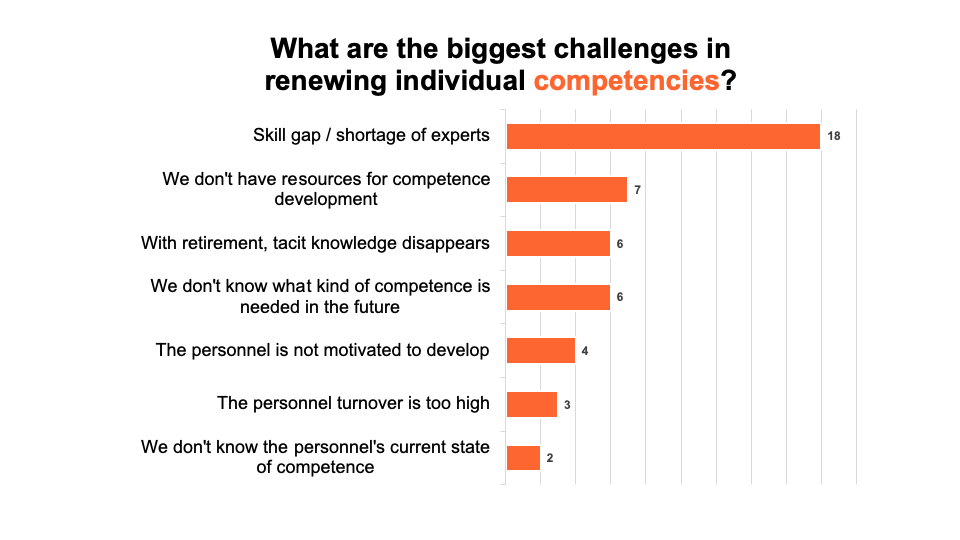
As the talent shortage grows, competing for the best talent is no longer enough. To succeed in the future, organisations must make efforts to ensure they have the best talent. It is essential to identify the capabilities and competences that will give organisations a competitive advantage, and how these capabilities will be put into practice and developed.
In 2022, we published a strategic renewal study report in which we asked the management of listed Finnish companies what factors help them innovate and what capabilities and competencies are needed in the future. The need for competence renewal has been identified, but a more explicit focus and roadmap are still required. This topic has triggered a lively debate among our clients' management on the future skills needs and how to lead the development of these skills.
In this article I highlight three critical points for senior management in organisations in managing future competencies:
1. Identifying strategic capabilities and competencies as part of the strategy work
Understanding what capability and competence mean for the organisation to lead future competencies is essential.
Capability is a broader concept than competence. Strategic capability is the ability of an organisation to use its resources (e.g. financial resources, means of production, partnerships, processes, brand, culture) in a way that realises its long-term vision and delivers competitive advantage in the future. Capability requires competence, which refers to the attributes, knowledge and skills of individuals and teams that can be developed.
Today, competitive advantage is increasingly achieved in a unique value-creating ecosystem. The ability to operate in such an ecosystem or value network requires a wide range of shared skills and activities, such as the ability to identify and lead the potential of networks, build trust, co-learn, and a wide range of contractual and collaborative skills. Once these competencies are broken down into concrete skills, they can be led systematically in a way that is easy to communicate to staff.
The development of competencies should be more than just a side note in the annual report. Identifying strategic capabilities and competencies should be an organic part of the strategy work. This requires extensive cooperation between management, HR and key personnel and a shared understanding of the competencies that will give the company a competitive advantage in the future. Strategy implementation is about building these capabilities.

"Strategic talent development is the development of the capabilities and competencies that gives an organisation a competitive advantage. It is successful when talent management and development is high on the business agenda and sponsored by the organisation's top management."
2. Putting competence development on the top management's agenda
One of our research findings was that competencies at top management level is not covered enough overall, or at most there is a thin description of competence needs at a high level.
Competencies seem to be an abstract concept, which is partly why their development is too easily outsourced to the HR department as a separate task. In the absence of a common language and management team responsibility for leading strategic competence development, staff development tends to focus too much on processes:
- Conducting development interviews.
- Carrying out competence mapping.
- Identifying and assessing potential individuals.
- Building career path models without a direct link to strategic business objectives.
Management should have a clear, shared vision of what competencies are required to succeed in the strategy, how to grow them, and how development translates into practical action and business results. Competence development can and should be made visible in the operational implementation of the strategy through measures and indicators so that progress is systematically monitored as part of the management agenda. HR has a role to play in facilitating this - but the most important thing is that the management of different competencies is made accountable among the members of the management team and brought down to the individual level as part of day-to-day management so that everyone in the organisation understands the direction in which their own competencies should be developed.
"Strategic talent development is the development of capabilities and competencies that will give an organisation a competitive advantage in the future."
3. Developing individual competencies as part of building organisational capability
Talent development is the broad concept of harnessing the growth potential of human resources through development, career rotation and training activities. One of the challenges of Talent Development is that it is often individual-centred: top individuals are identified, assessed and developed for retention purposes or as part of succession planning for more demanding and managerial roles.
Strategic talent development is the development of capabilities and competencies that will give an organisation a competitive advantage. The starting point is that the criteria used to identify, assess and develop people with growth potential, i.e. talent, are derived directly from these competency needs. Identifying potential groups of people whose skills renewal or skills pooling will play an essential role in organisational renewal has become increasingly important.
When an organisation invests in talent and organisational development programmes, it is crucial to ensure they are well-tailored and directly linked to the business and its transformation. The effectiveness of such programmes is weighed against strategic business objectives and sponsored by the organisation's senior management.
Strategic talent development - a competitive advantage for the future
It is high time to start creating the competitive advantage of the future by systematically managing the development of future talent at the management team level.
We can support you and your organisation in strategic talent development. Read more about strategic talent development and please get in touch to discuss further.
 About the author
About the author
Emilia Sainisalo (Ms.Soc.Sc, Social Psychology), Certified Business Coach (ACC), works at Hanken & SSE as an Account Director and executive coach. Emilia has extensive experience in Business HR and strategic HRD in global environments. She specialises in leadership, leadership team & culture development, leading competency, change leadership, solution design and individual business coaching.



